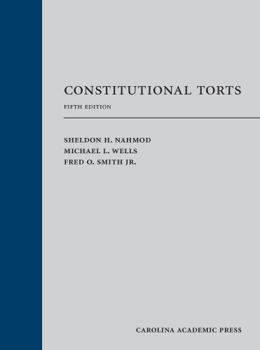Constitutional Torts
This casebook emphasizes important circuit court decisions together with relevant Supreme Court case law. This enables students to see how principles articulated in Supreme Court decisions are implemented by lower courts. Constitutional Torts also addresses affirmative duties, constitutional tort actions in state courts, and attorney's fees. Further, this book is organized around the statutory language of section 1983, thereby driving home the crucial distinction between prima facie cases and constitutional tort immunities and defenses. The fifth edition covers Supreme Court decisions from the past several years, including Ziglar v. Abbasi (2017) and Hernandez v. Mesa (2020) (chapter 1), Manhattan Community Access Corp. v. Halleck (2019) (chapter 2), Kingsley v. Hendrickson (2015), Knick v. Township of Scott (2019), and Manuel v. City of Joliet (2017) (chapter 3), Armstrong v. Exceptional Child Center (2015) (chapter 4), Nieves v. Bartlett (2019), Lozman v. Riviera Beach (2018), and Los Angeles v. Mendez (2017) (chapter 6), Ziglar, supra, White v. Pauly (2017), Hernandez v. Mesa (2017), District of Columbia v. Wesby (2018), Kisela v. Hughes (2018), and City of Escondido v. Emmons (2019) (chapter 8), McDonough v. Smith (2019) and Knick, supra (chapter 10), Goodyear Tire and Rubber Co. v. Haeger (2017) (chapter 12). As always, the circuit courts have been active as well, and we have revised the notes to take account of significant recent developments. Constitutional Torts studies circuit and district court decisions as crucial to understanding the developing law of Section 1983, because (a) they show how general principles of law pronounced by the Supreme Court are actually applied; (b) the Supreme Court rarely visits some important aspects of the doctrine; and (c) in this dynamic area of the law, the lower courts are the first to identify new issues and new ways of approaching old problems. At the same time, the materials continue to emphasize the "tort" aspects of Section 1983 litigation, especially with regard to affirmative duties, causation, official immunity, and damages. These materials illuminate both the similarities and differences between constitutional torts and analogous principles developed in the common law tort setting. By studying both tort and constitutional principles, students learn how to argue for and against the application of common law tort principles to constitutional tort issues, and will come to understand both the theoretical and practical consequences of the constitutional underpinnings of the litigation. Constitutional Torts provides a thorough treatment of compensatory damages, punitive damages, injunctive relief, and attorneys' fees. These materials not only explain the basic doctrine, but explore their strategic implications on the conduct of litigation.
Format:Hardcover
Language:English
ISBN:1531017525
ISBN13:9781531017521
Release Date:July 2020
Publisher:Carolina Academic Press
Length:898 Pages
Weight:3.70 lbs.
Dimensions:10.0" x 1.5" x 7.8"
Related Subjects
LawCustomer Reviews
0 rating





